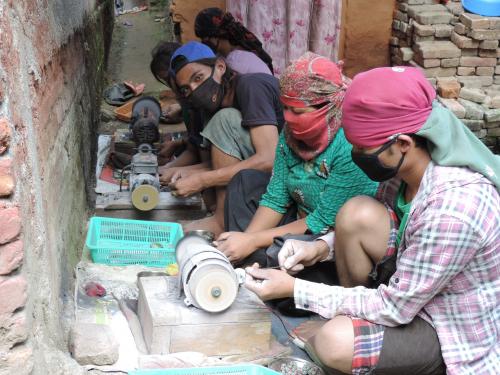
As usual when coming out of my rented flat I turn to the right to travel to the main road. Next to the flat, where my landlord lives on the third and fourth floors and some small business owners rent space on the first floor, is a block with carved out small one room homes. In the time that I’ve lived in Nepal, except for one older man, I’ve seen a number of families moving in and out of these spaces. The rooms consist of a stove and beds and, I assume, all of the family’s possessions. The shared toilet faces the path which anyone living in the area must take to get to the main road. Clothes and dish washing are done directly outside of the block.
I’ve been noticing increasing economic activity and people, crushing multi-colored stones, pressing these into beads and then using sanding/smoothing machines, to finish these. All of the people look fairly young and there are also small children. The work seems to never stop. I don’t know how much the people get paid or how long the work will last, but they generally seem to be happy.
Coming out onto the road leads to a number of small shops and I observe at different times of the day owners sitting, maybe watching television, waiting for customers. A new momo shop, converted from a fruit store, has opened and is buzzing with activity. This is operated by a husband and wife, but primarily by the wife, as the husband goes to another restaurant job during the day. One “dream” is to eventually graduate to also selling sandwiches. All of the shops owners, no matter what their product line, are making a go of it, conversing with one another during lull times, constituting a small community.
I’ve recently seen two documentaries. The Economic of Happiness indicates how globalization, with an alliance between corporations and governments, has worked to destroy local cultures with increasing power in the hands of big business and banking. Schooling the World points out how education systems, fueled by “cultural superiority” and the notion of leading to a “better life don’t necessarily prepare people for appropriate jobs and adequate livelihoods. (For an example of forced education see the movie Rabbit Proof Fence).
Globalization leads to trying to be more like the west and its underlying culture of wanting more money, mass consumerism and never having enough, causing homogenization and essentially destroying local culture, leading to unhappiness. A prime example of this are malls in any part of the world, where one sees the same types of products, with the same types of people wearing the same or similar types of logo branded clothing, most likely made in sweatshops.
Localization, i.e. people coming together, e.g. through local farmers markets, or making conscious efforts to purchase locally, has been a direct reaction to globalization. Various initiatives in the US includes the Slow Food Movement, healthy communities or home/local schooling, enabling parents and local communities to teach what is appropriate.
Governments, local corporates and civil society all have a role to play in maintaining/developing healthy communities and in supporting the type of small businesses that we all see throughout many developing countries. Globalization doesn’t really care about getting people out of poverty and sharing in resources, but does care about mass production, lowering costs in order for greater profits to be made. However through conscious local initiatives spearheaded by and partnered with all of the sectors mentioned above we can focus on doing what is best for the population where we live. It doesn’t take much in buying and shopping locally and supporting people such as my neighbors when they sell their moti beads or buying local produce sold by my vegetable seller. In the end maybe we will all be happier.










Add new comment